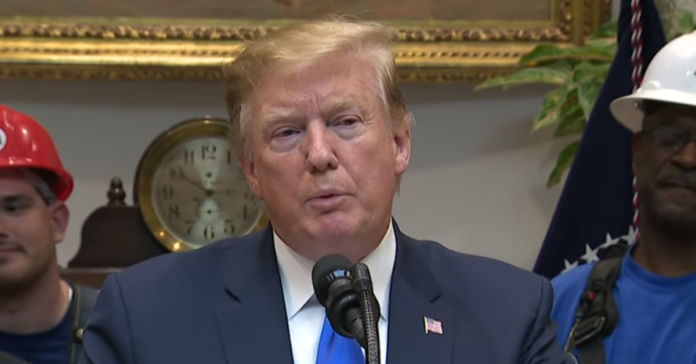President Trump is officially taking off the kid gloves and will invoke the Insurrection Act to remove illegal immigrants from our country.
The left, of course, is furious but while the act was passed back in 1807, it has been amended as late as 2006 to reflect the new reality in America.
In other words, tough luck Pelosi. From The Daily Caller:
President Donald Trump is planning on using the Insurrection Act to remove illegal immigrants from the United States, The Daily Caller has learned.
According to multiple senior administration officials, the president intends to invoke the “tremendous powers” of the act to remove illegal immigrants from the country.
“We’re doing the Insurrection Act,” one official said.
Under the Insurrection Act of 1807, the president has the authority to use the National Guard and military in order to combat “unlawful obstruction or rebellion” within U.S. borders. The act was last invoked in 1992 by George H.W. Bush to quell the Los Angeles riots, and was also used by Eisenhower in 1957 to enforce school desegregation in the south.
An official expressed concerns that Trump’s use of the act’s powers would face legal challenges, pointing to the lawsuits against the president’s travel ban from majority-Muslim countries. However, as the official noted, the travel ban ultimately prevailed in the Supreme Court.
In addition to the Insurrection Act, the president is also considering declaring the country full and insisting that the U.S. can no longer handle the massive influx of illegal immigrants. 2019 is currently on pace to reach the highest levels of illegal immigration in a decade.
“If you take a ship and it holds 1,000 people maximum — one more person and the ship is going to collapse,” the official explained. “The country is full.”
“Our hospitals are full, our detention centers are full,” they added.
From Wikipedia:
“On September 30, 2006, the Congress modified the Insurrection Act as part of the 2007 Defense Authorization Bill (repealed as of 2008). Section 1076 of the law changed Sec. 333 of the “Insurrection Act,” and widened the President’s ability to deploy troops within the United States to enforce the laws.
Under this act, the President may also deploy troops as a police force during a natural disaster, epidemic, serious public health emergency, terrorist attack, or other condition, when the President determines that the authorities of the state are incapable of maintaining public order.
The bill also modified Sec. 334 of the Insurrection Act, giving the President authority to order the dispersal of either insurgents or “those obstructing the enforcement of the laws.” The law changed the name of the chapter from “Insurrection” to “Enforcement of the Laws to Restore Public Order.”
The 2008 Defense Authorization Bill, repeals the changes made in the 2007 bill.[4]
The 2007 Defense Authorization Bill, with over $500 billion allocated to the military, and which also contained the changes to the Insurrection Act of 1807, was passed by a bipartisan majority of both houses of Congress: 398-23 in the House and by unanimous consent in the Senate.[5] For military forces to be used under the provisions of the revised Insurrection Act, the following conditions must be met:
(1) The President may employ the armed forces, including the National Guard in Federal service, to–
(A) restore public order and enforce the laws of the United States when, as a result of a natural disaster, epidemic, or other serious public health emergency, terrorist attack or incident, or other condition in any State or possession of the United States, the President determines that–
(i) domestic violence has occurred to such an extent that the constituted authorities of the State or possession are incapable of maintaining public order; and
(ii) such violence results in a condition described in paragraph (2); or
(B) suppress, in a State, any insurrection, domestic violence, unlawful combination, or conspiracy if such insurrection, violation, combination, or conspiracy results in a condition described in paragraph (2).
(2) A condition described in this paragraph is a condition that–
(A) so hinders the execution of the laws of a State or possession, as applicable, and of the United States within that State or possession, that any part or class of its people is deprived of a right, privilege, immunity, or protection named in the Constitution and secured by law, and the constituted authorities of that State or possession are unable, fail, or refuse to protect that right, privilege, or immunity, or to give that protection; or
(B) opposes or obstructs the execution of the laws of the United States or impedes the course of justice under those laws.




